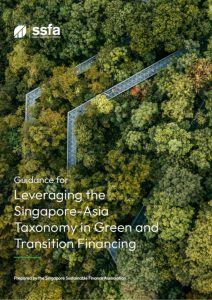Executive Summary

Southeast Asia’s public and private sectors are making significant strides in the climate transition, creating opportunities for financiers to direct capital towards credible green and transition activities. While green activity definitions are globally recognised among international taxonomies as contributing to outcomes aligned with the Paris Agreement, or with a 1.5-degree science-based pathway, the concept of transition continues to evolve. It is therefore necessary for a clear and consistent definition of what constitutes a credible transition to guide financial institutions and the real economy in channelling capital towards meaningful transition initiatives in the region.
To that end, the Monetary Authority of Singapore (MAS) in December 2023 launched the Singapore-Asia Taxonomy for Sustainable Finance (SAT). The SAT details thresholds and criteria for green and transition activities that contribute to climate change mitigation across eight focus sectors. As the first multi-sector taxonomy globally to include a transition category, the SAT seeks to promote transition financing and catalyse transition activities. In just over a year since its launch, the SAT has seen encouraging adoption. Financial products have been developed based on it, and banks and companies have aligned with or referenced the SAT in their sustainable finance frameworks. With this guidance, the Singapore Sustainable Finance Association (SSFA) hopes to further the SAT’s adoption by addressing practical challenges faced by financiers and borrowers when applying the SAT in green and transition financing instruments. While our guidance primarily focuses on transition, several sections¹ offer guidance on applying SAT Technical Screening Criteria (TSC) for both green and transition activities.
The structure of this guidance is as follows:
Part 1
- Section 1 provides guidance on addressing data availability challenges, recognising situations in which specific data points needed to meet green or transition thresholds are not readily available.
- Section 2 outlines the treatment of interim amber thresholds and sunset dates.
- Section 3 establishes grandfathering provisions, applied as the TSC is revised.
- Section 4 presents practical approaches for meeting entity-level transition plan requirements.
- Section 5 clarifies the distinction between amber and amber (measures) to guide financiers in their practical applications.
Part 2
The guidance also provides early industry thinking on how financiers and borrowers can reference the SAT to recognise transition efforts. In these instances, financiers and borrowers may still explore transition financing under their respective sustainable or transition financing frameworks. It should be noted that such transactions will not be considered SAT-aligned.
- Section 6 outlines how certain non-aligned financing instruments might qualify for transition financing through referencing the SAT, notwithstanding that the underlying assets or projects cannot fulfil all criteria under the SAT due to reasons beyond the borrower’s control, or where some criteria may not be fully relevant for the asset or project being financed.
- Section 7 presents alternative approaches to address the limited commercial availability of carbon capture and storage (CCS); and carbon capture, utilisation and storage (CCUS) solutions.
- Section 8 provides guidance on transition financing for new assets not currently referenced in the SAT.
- Section 9 explores whether enabling and value-chain activities that support green and transition efforts can be considered for green and transition financing.
Each section follows a consistent structure: providing context of the challenge, addressing key questions, offering detailed responses and illustrating through Case studies.
Second-Party Opinion (SPO) providers and industry associations participated as working group members in the production of this guidance to ensure the approaches set out are credible and accepted as industry best practices.
The following key terms used are defined as such:
- Financiers: Refers to financial institutions, including banks, institutional investors and other entities that provide capital for projects and assets.
- Borrowers: Refers to companies, project developers or other entities seeking financing for their assets or projects.
- SPO provider: Refers to a third-party environmental, social and governance (ESG) expert that provides an independent opinion on the alignment of sustainable finance instruments with the relevant industry standards and principles.
Acknowledgements
This guidance was developed by the Taxonomy workstream of the Singapore Sustainable Finance Association (SSFA), with inputs from workstream members, and reviewed by the SSFA Executive Committee (EXCO).
This workstream is co-led by Jeong Yoon Mee, Head of Sustainability Office, Global Wholesale Banking, OCBC; Sylvia Chen, Head of ESG Research, Asia, Amundi; and Shilpa Gulrajani, Head of Sustainable Finance, Institutional Banking Group, DBS. The workstream is coordinated by the SSFA Secretariat and supported by the Monetary Authority of Singapore (MAS).
This document does not necessarily represent the views of the Workstream Coleads, any individual member of the workstream, or the SSFA EXCO.
Members of the workstream include representatives from:
| No. | Organisation | Name | Designation |
|---|---|---|---|
| 1 | OCBC (Guidance Sub-group Lead) | Jeong Yoon Mee; and Vanessa Chow | Head of Sustainability Office, Global Wholesale Banking, and SSFA Taxonomy Workstream Co-lead; and Director, Sustainability Office, Global Wholesale Bank |
| 2 | Amundi | Sylvia Chen | Head of ESG Research, Asia, and SSFA Taxonomy Workstream Co-lead |
| 3 | DBS | Shilpa Gulrajani; and Jordan Issaakidis | Head of Sustainable Finance, Institutional Banking Group and SSFA Taxonomy Workstream Co-lead; and Vice President |
| 4 | Bloomberg | Isaac Lee | Sustainable Finance Solutions, APAC |
| 5 | BNP Paribas | Sabrina Noiran; and Antonina Redko | Head of CIB Sustainable Finance & Engagement APAC; and Head of Business Development SEA |
| 6 | CIMB Singapore | Sazali Baharom | Head of Islamic Banking & Sustainability |
| 7 | Clifford Capital | Onn Ming Bun | Assistant Vice President, Group Risk |
| 8 | Crédit Agricole Corporate & Investment Bank | Roy Chan | Director – Sustainable Investment Banking, Southeast Asia, India & Australia |
| 9 | DNV | Pang Toh Wee | Senior Consultant |
| 10 | ERM | Seena Dabral | Associate Partner, Corporate Sustainability and Climate Change |
| 11 | EY | Praveen Tekchandani | Partner & ASEAN Climate Change & Sustainability Services Co-Leader |
| 12 | HSBC | Martin Prise; and Goh Ping Yao | Associate, Sustainable Debt Capital Markets, APAC; and Associate Director, Sustainability, ASEAN |
| 13 | Institute of Banking and Finance Singapore (IBF) | Carolyn Neo | CEO |
| 14 | Manulife Investment Management | Chiang Yi-Chen | Senior Director, Sustainability Research and Engagement |
| 15 | Moody’s Ratings | Jeffrey Lee; and Yim Jing Li | Senior Vice President – Sustainable Finance, Head of Assessments, APAC; and Sustainable Finance Analyst |
| 16 | MSCI | Elsa Ben Hamou Dassonville | Executive Director, Head of APAC ESG & Climate Consultants |
| 17 | Standard Chartered | Jennifer Ng; and Jasmine Hussain | Head of Sustainable Finance Solutions – Governance; and Assistant Director (Sustainable Finance Solutions) |
| 18 | Sumitomo Mitsui Banking Corporation (SMBC) | Leong Li Sun; and Sue Nguyen | Director, ESG Policy and Engagement; and AVP, Corporate Banking Department – Sustainability Solutions |
| 19 | Sustainable Fitch | Melissa Cheok | Associate Director, ESG Investment Research |
| 20 | United Overseas Bank (UOB) | Adrian Ow; Eng Sok Hui; and Samuel Tan | Managing Director and Head of ESG Solutions; Head of ESG Solutions (Built Environment); and |
| 21 | Asia Pacific Loan Market Association (APLMA) [Observer] | Chiva Lai | Senior Director |
| 22 | Climate Bonds Initiative (CBI) [Observer] | Bridget Boulle | Principal Technical Advisor |
| 23 | International Capital Market Association (ICMA) [Observer] | Mushtaq Kapasi; and Simone Utermarck | Managing Director, Chief Representative Asia-Pacific; and Senior Director, Sustainable Finance |
General Disclaimer
The information and opinions expressed in this report are presented for informational purposes only and should not be considered as professional, financial, legal, or investment advice. Readers should exercise their own independent judgement and seek independent advice before making any decisions based on the content set out in this report.
While every effort has been made to ensure the accuracy and reliability of the information presented, no representation or warranty, express or implied, is made regarding its completeness, accuracy, or suitability for any particular purpose. The authors, contributors and the SSFA do not accept any responsibility or liability for any errors, omissions, or any consequences arising from reliance on this report.
This report may contain forward-looking statements based on available information and assumptions at the time of publication. These statements are subject to change without notice, and actual outcomes may differ. The authors, contributors and the SSFA disclaim any obligation to update or revise any statements in light of new information or future developments.
Nothing in this report constitutes an offer, solicitation, or recommendation to buy or sell any financial instruments, securities, or investment products. Readers are solely responsible for assessing the relevance and accuracy of the information provided.
